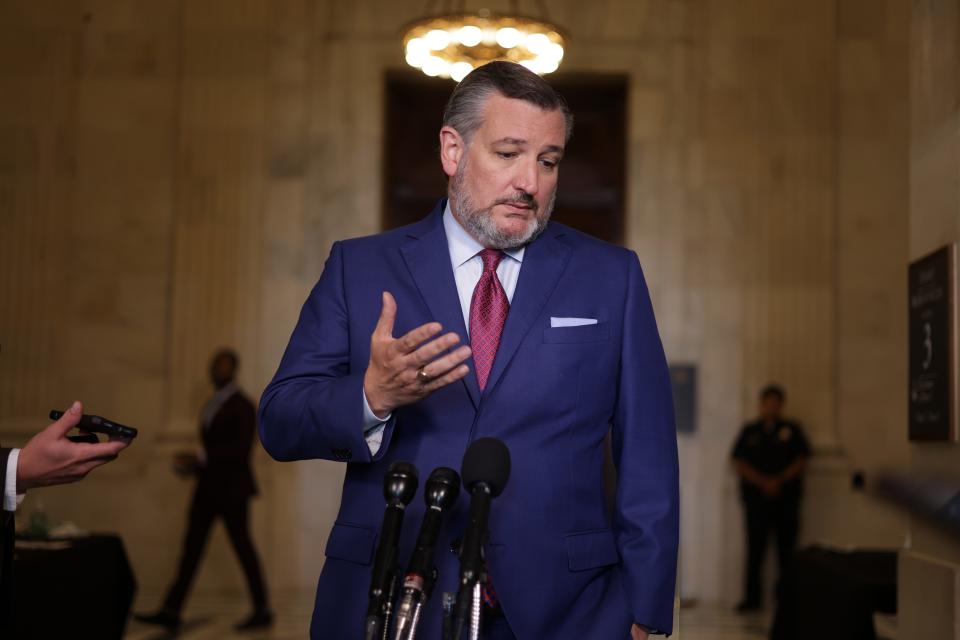Cruz calls for U.S. semiconductor production boosts to mitigate 'vulnerability' to China
- Oops!Something went wrong.Please try again later.
Identifying it as a "unique vulnerability" and an issue of national security, U.S. Sen. Ted Cruz is calling for advancements in domestic semiconductor manufacturing, saying the U.S. economy is too reliant on foreign production and he's concerned about China's emergence in the industry.
Specifically seeking to attach provisions to the National Defense Authorization Act to streamline environmental review requirements for semiconductor plants, or fabs, Cruz laid out his case for bolstering U.S. involvement in the industry, with a focus on creating jobs in Texas.
"If you look at our economy, just about every piece of electronics in our lives uses semiconductors," Cruz said Thursday in Round Rock. "And right now, the United States economy is far too dependent on foreign manufacturing, particularly in advanced semiconductors. That's a vulnerability, and a vulnerability in particular to China that is intolerable."

During a news conference Thursday after participating in a roundtable discussion with industry leaders — including representatives from Samsung, Williamson County Judge Bill Gravell and Dr. David Staack, director of the Texas A&M Semiconductor Institute — Cruz said his amendment will help existing projects and those with little federal funding to avoid the potential for fabs to experience "yearslong" delays in coming online.
Over the past three years, there has been an influx of over $61 billion in semiconductor investment in Texas along with 8,000 industry jobs to come to the Lone Star State, according to Cruz, the ranking Republican on the U.S. Senate Committee on Commerce, Science and Transportation.
"It leaves in place environmental protections, but it speeds the process up so that it doesn't become a long torturous delay that prevents the jobs from being created and the fabs from being built," Cruz said of his amendment to the defense spending bill.
Even though he voted against the bipartisan CHIPS and Science Act, which President Joe Biden signed into law in 2022 to boost American semiconductor research, development and production, Cruz said he wants to help oversee the implementation of the industry investment and push for fewer "regulatory burdens" as his amendment is considered by the U.S. House, which has a slim Republican majority.
"I then have a responsibility, an oversight responsibility, to make sure we can do everything possible to prevent the cronyism and the political patronage that often accompanies programs like that," Cruz said.
More: Samsung to delay mass chip production at massive Taylor facility until 2025, report says
Earlier Thursday in Laredo, Cruz made a similar argument in pushing the Biden administration to relax regulatory provisions in the permitting process for a series of four international bridge projects along the Rio Grande in Laredo, Eagle Pass and Brownsville.
In closing the semiconductor roundtable at the Texas A&M Health Science Center in Round Rock, Cruz pushed back on concerns stemming from a report last week about Samsung's $17 billion semiconductor facility in Taylor delaying its anticipated chip mass production starting date.

In November 2021, when Samsung announced the project, the plant about 25 miles northeast of Austin was expected to be operational by the first half of 2024.
"I'm confident Samsung is going to hit its expected targets, and then that's certainly what I hope to see and expect to see," Cruz said, referencing conversations between his office and Samsung.
Samsung spokesperson Michele Glaze told the American-Statesman last week that the facility is on track to start production in late 2024.
Statesman reporter Kara Carlson contributed to this report
This article originally appeared on Austin American-Statesman: Sen. Ted Cruz calls for boosts in U.S. semiconductor manufacturing

